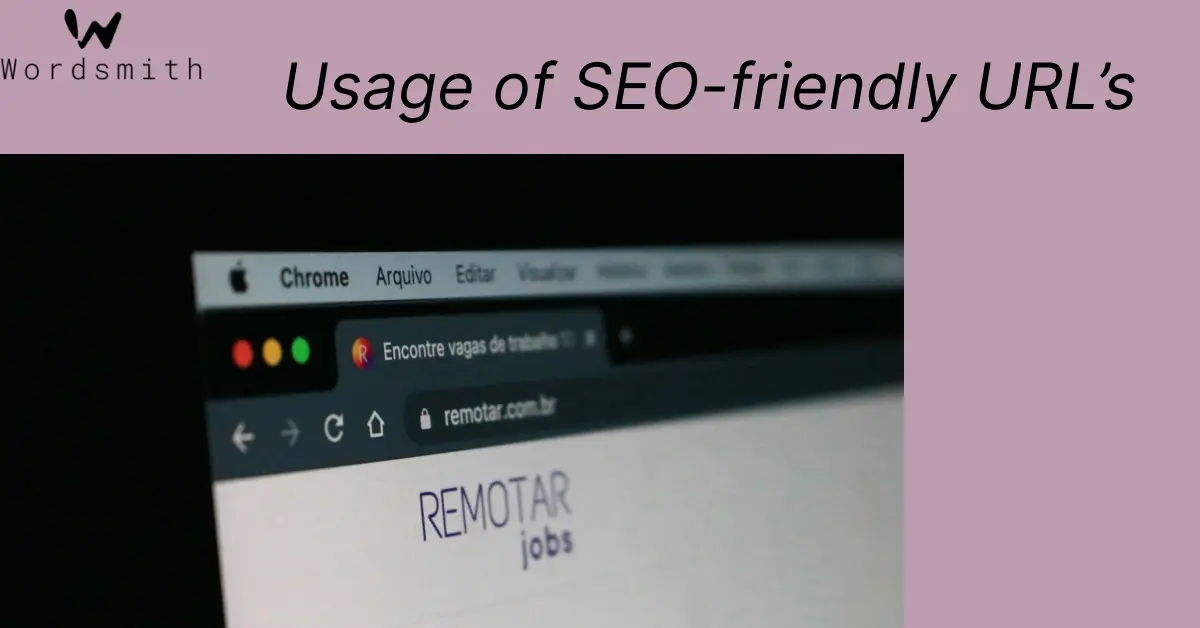Usage of SEO-friendly URLs
Jaishree D | 05-03-2024 | 04 min read

The core of your website is its URL, and you may boost website traffic by optimizing it. A URL appears more credible, performs considerably better in a Google search, and is simple for your audience to share. An optimized URL makes it simple for users and search engines to deduce the topic of the landing page. Additionally, SEO-friendly URLs have effects on your website beyond merely ranking.
SEO-Friendly URLs: What Are They?
Links that are optimized for Google search engines and meet consumers' high requirements are known as SEO-friendly URLs. URLs that are shorter and contain more keywords are optimized with SEO in mind.
You might think of keywords and meta descriptions when you think of SEO. Technical SEO, however, goes beyond that. For search engines and users alike, URLs must be perfectly optimized. Search engines can infer from descriptive URLs what the content of a page is about. It is vital to ensure that they are true, captivating, and well-assembled.
Does SEO Affect a URL?
To be clear, new or old URLs do not directly affect ranking in a significant way. It is crucial to use keywords that enhance your website's search engine visibility, as this can lead to a rise in visitors and ultimately impact your ranking. Therefore, even while URL optimization is crucial, avoid designing useless URLs merely to incorporate keywords. One important ranking component is URLs. Relevance inside an index is another factor that search engines use to rank a page or website. Although a domain's authority is taken into consideration by Google, it is advisable to include keywords in your URL since they serve as a ranking factor.
Why Does Having an SEO-Friendly URL Matter?
The entire purpose of having a URL structure on websites that is optimized for search engines is to make the process easier for SEO managers to handle. A URL displays information about a website, and search engine crawlers may locate specific pages more easily when a well-structured URL is used. Title tags, meta tags, link anchor text, and your URL all provide search engines with ranking signals that indicate the context of your content. Additionally, it's crucial for SEO content optimization tactics. Google's SEO beginner's guide includes extensive advice on how to use your URL structure because it is so important.
Here are several major justifications for the significance of SEO-friendly URLs:
- Click-through rates are increased by SEO-friendly URLs: One of the first things a user sees on a search results page is your URL. Its perfect structure will result in a greater CTR.
- SEO-friendly URLs decrease confusion and boost credibility: User experience is improved with SEO-friendly URLs. They are frequently easily recalled and appear secure.
- Meaningful search results are enhanced by SEO-friendly URLs: Properly formatted URLs facilitate crawlers' ability to index your information. It draws more visitors and frequently raises your SERP ranking.
- The proper URL techniques to utilize to impress search engines can be quite complex, perplexing, and challenging to understand at times.
What URL Best Practices Are There For SEO?
- Remember that there are no hard and fast guidelines for the ideal URL structure. These are only techniques that have been refined over time by professionals who have shared both their failures and their achievements. Although URLs might vary based on the goal and functionality of the website, more SEO experts employ some general guidelines to develop the perfect URL.
Make use of the right URL structure
- Employ the HTTPS protocol.
- Take the www down.
Ensure that your content and URLs match
- Just by looking at the URL, a user ought to be at ease and able to infer with reasonable accuracy what the content of a page is.
- You must ensure that your URL accurately reflects the content of the page for this to occur. It would be ideal to use a precise phrase or term that is relevant to the page's content.
Give your URLs target keywords
- Ensuring that each page has at least one well-researched keyword optimized is a fantastic idea. Your URL should then contain that term. Additionally, it is crucial to ensure that the most significant keyword appears first in your URL.
Is it appropriate to put a URL in the meta tags?
- Yes, is the succinct response. Let me try to simplify sitemaps and URLs as they can be a bit confusing. Remember that a lot of WordPress eCommerce themes and plugins already include this information. Thus, it might not be a concern for you. In any case, the following information is useful:
- Meta tags are essential for indexing and showing relevant content in search engine results pages (SERPs), even if they have no direct impact on a page's ranking. It raises the organic traffic to your website and improves its search engine ranking.
- In order to provide you more control over how your website's pages show up in search engine results, Google claims to support both page-level metatags and inline directives.
- Webmasters can assist crawlers in finding the most relevant information about their websites by using page-level meta tags. Search engines only read the meta tags they can comprehend and discard the rest. Metatags are used to give customers information.
Are URLs relevant in Social Media?
Your SEO is impacted by the way you employ URLs and links on and off your website.
The term "link-building" refers to a group of techniques used to increase the number of external links pointing to your website. Another name for this is backlinks. In the event that your URL isn't optimized for search engines or doesn't look credible, URLs may also have an impact on your internal linking strategy. Having stated that, a significant portion of your link strategy must involve social media. It is beneficial to keep in mind that each Social media platforms provide various avenues for enhancing your business's visibility.
Potential customers find them to be tidy and appealing. They are excellent social media and require less space to share.
In addition to keeping your links brief for social media, you want to think about utilizing shortened URLs that include your company name. You may establish more authority and credibility on social media by utilizing these two techniques.
Popular blogs

Handling workplace conflicts: An HR guide
Have you ever been caught in a workplace drama and wondered, 'Why can't we all get along?' Well, you're not alo...

How Can HR Drive Sustainability Initiatives in the Organization?
Sustainability is a significant concern in our collective consciousness, especially as we look to the future an...

Benefits of Reading
The foundation of both intellectual and emotional growth is reading. It develops critical thinking abilities, b...
Submit a Comment